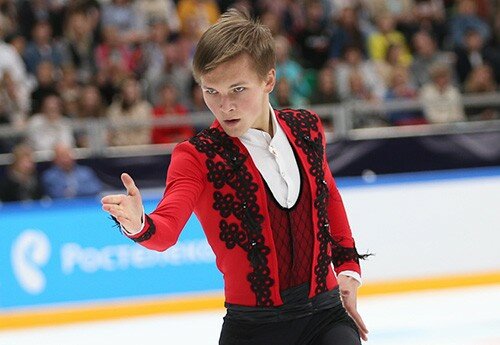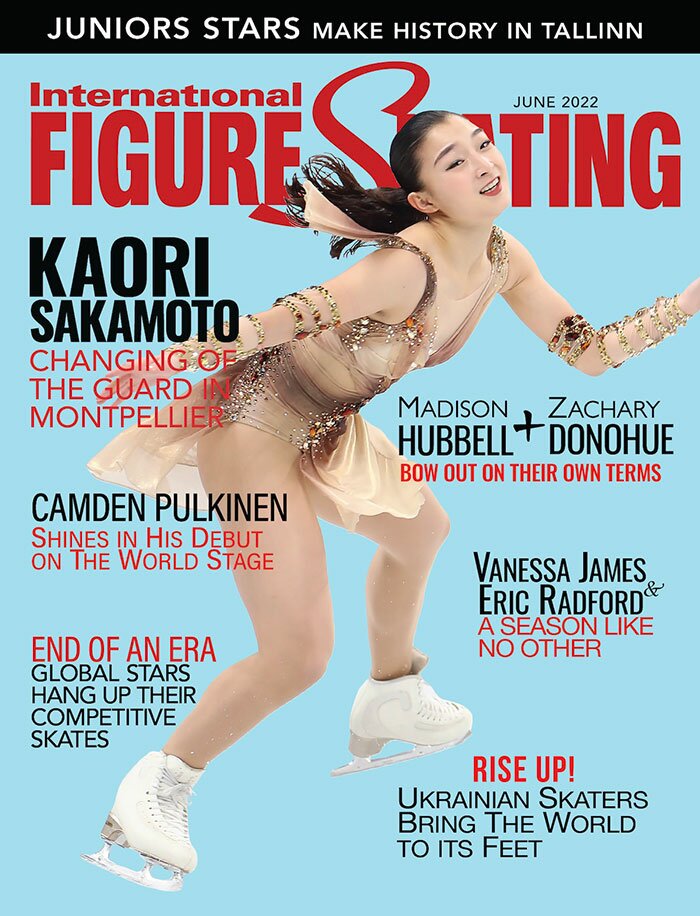
With the experience of an Olympic year in his back pocket, this season is like a fresh start for Mikhail Kolyada.
Last season, the two-time Russian champion qualified for a Grand Prix Final for the first time and captured the bronze medal in Nagoya. He followed that up with two more third-place finishes at the European and World Championships.
At the 2018 Olympic Winter Games, Kolyada placed eighth in his individual competition. However, he went home with a silver medal from the Team Event.
Though there has never been any doubt about his potential, a lack of consistency has been his nemesis. “Last season was a huge learning experience. I definitely grew up a lot. There are some things that I look at — at competitions — in a completely different way now,” said Kolyada. “I just started to feel differently inside. There is a moment for everyone when they realize that their youth has ended and adult life has started. At the same time, you still feel young and without pressure and that feeling doesn’t leave you. I think that is the most important thing.
“This past summer, in the half year since the Olympics, my consciousness changed. I still like to fool around, hang out and chat with my friends — that is still the same — but my perception of certain things is different.”
Following the 2018 World Championships, Kolyada and his long-time coach, Valentina Chebotareva, sat down to analyze the season. While they were satisfied with the overall results, both knew there was a lot of room for improvement. Consistency, once again, was the key word.
After reviewing the layout of his programs and studying the rule changes, they headed to Switzerland in June to work with Stéphane Lambiel on a new short program. Though Kolyada had his own ideas, when Lambiel suggested “Mon Cœur S’ouvre à ta Voix” (“I Belong To You”) by Muse, he agreed with the choice. “The program is somewhat similar to last year’s short, but it is a different character,” Kolyada said. “However, there is also suffering, love, and passion. It’s lyrical. It goes in waves, up and down. Stéphane developed the program and did the moves, but obviously I do it my way.”
Though Kolyada had worked with Lambiel once before, this was the first time the Swiss star had choreographed a program for him. “The work with Stéphane … I liked everything. The energy was great, the atmosphere was very friendly, and that makes it easy to work. I really like mountains, so I liked it in Champéry,” Kolyada said. “To be honest, I didn’t expect that it would come together so fast. Stéphane praised me that I quickly understood, but in fact it was not like that. I needed to think everything over and digest the information about where everything goes and what the hands and feet are doing.
“I analyzed how and where to place the elements in the program. I suggested some steps and transitions, but most of the ideas came from Stéphane. He imagined right away how the program should be. I agreed because I trust him and I saw what he was doing was with energy and commitment. I wanted to do the same. I always liked Stéphane as an athlete.”
While the Muse piece suits him, his choice of “Adagio from Carmen Suite” for the long program, choreographed by Olga Kliushnichenko, was unexpected. Kolyada said he had wanted to skate to this music since he was nine or 10 years old, “but we put this idea away and I remembered it only recently. I really like this music and wanted to try it because it energizes me. This program is different in every way from my old program — in the energy, the presentation, the emotions. I am different in it.”
Kolyada is one of three elite Russian skaters who chose selections from that opera for their long programs this season — the other two being Alina Zagitova and Maxim Kovtun.
In July, Kolyada and his coach headed to Lakewood, California, to work with Rafael Arutyunyan for two weeks. “We worked on the technical part and broke in the programs,” Kolyada explained. “It was important to see how they worked on the other side of the ocean, and to pick up information that I didn’t know before. Sometimes you have to change your environment and your usual routine in order to relax mentally. I wanted to know what a coach who is not coaching me thinks about me. Someone who is looking from the outside to say, ‘this is good, and this is not so good,’ and to get his opinion on what he thinks would be better. I tried it and I liked it. This really helps to move forward.
“When we are growing up, we think we know everything and can do anything, but Rafael told me that everything starts from the beginning, the basics. And so, we started from the very beginning, relearning the basics, step by step. We worked mostly on triple jumps and Rafael pointed out some things to me where I was having problems. He said, ‘your problem is not the jump itself, but in the entry.’ I thought that was interesting. I tried to do the entry he suggested and it was fine. He told me the most important thing is to work the right way, and not to spend energy left and right. I’m trying to use all the advice he gave me.”
Kolyada headed to the annual Russian test skates in September with a new maturity and perspective. “Everything was different. I approached the situation in a different way, but I can’t express it in words,” he said.
The positive feedback he received at the test skates was backed up at his first Challenger Series event, Ondrej Nepela Trophy, which he won. “The performance came out quite bright in my opinion,” he said. “Looking at the scores, the program was well received. Not everything worked out, not everything was smooth. It’s still a little rough around the edges and I need to break it in. There is always something to improve, but it is clear that most of the work was done in the summer. Now we’re making adjustments with the presentation, interpretation and everything else.”
A few weeks later, Kolyada won his second Challenger title at Finlandia Trophy, but it was no walk in the park. His practices did not go well and he had a hard time pulling himself together. “I was in a strange condition. I felt that I was well prepared, I didn’t have any sleeping problems, and I felt great,” he recalled with a sigh. “But it happens sometimes that you struggle to pull yourself together and your fingers are all thumbs. Everything was fine at home, but once I got there, everything started to crumble.
“There were mistakes that I can’t forgive myself for — like the loop. I did a double and on top of that I did it poorly. I almost fell on the entry to the second quad toe, so I decided quickly to do a triple. I saw in the protocol in Bratislava that you get more points for a good triple than for a fall on a quad. Nevertheless, I should go for the quad, rotate it and do it anyway. I try to approach each competition with responsibility, but it does not always work.”
Kolyada had been battling a bad cold since August, which started clearing up just days before Finlandia Trophy. He started building his conditioning level and doing more run-throughs in practice to prepare for his next event, the Grand Prix in Helsinki.
As the changes to the Grade of Execution scores impacted the layout of his programs this season, Kolyada has been testing out different jump combinations. At the test skates, he had two triple Axels and a quad toe in his free. He switched out one Axel and added a second quad toe at Ondrej Nepela Trophy and kept the same layout for Finlandia Trophy. He did not include the quad Lutz or Salchow in his programs in the early part of the season, preferring to have them consistent before adding them.
“We are trying one thing at one competition and another thing at another competition. Whatever works well at one event, we’ll keep in the program,” Kolyada explained.
“Now the most important thing is to skate clean, to show the programs and not only the jumps. I think this year most people will pay attention to the second mark — the presentation, choreography and interpretation — so that everything will be at a high level. Maybe some people will move away from difficult jumps so the programs are cleaner. In general, we’ll experiment this season.”
The off-season held another challenge for the 23-year-old St. Petersburg native. In addition to preparing his programs and his international trips, he had to defend his master’s thesis, which was based on the science of multi-revolution jumps in figure skating. “Obviously, athletes are used to a physical workload, but that was a mental workload,” Kolyada recalled. “It was especially hard to get back into that kind of work when you haven’t done it for a while. But now I have dealt with university, the soul is at peace. Working on the master’s thesis was nerve-wracking, but I can’t say that it was more difficult than competing at Worlds or the Olympic Games.”
Kolyada successfully defended his thesis and graduated from the Lesgaft National State University of Physical Education, Sport and Health at the end of June. “I gained new knowledge that I can use in my life. Without a diploma it is hard to find a good job later,” Kolyada said. “I won’t skate until I’m 50 years old. I need to think about the future.”
In late December, a week prior to Russian nationals, Kolyada was hospitalized with sinusitis. His participation in the competition was in doubt, but Kolyada, unwilling to miss the opportunity to earn a place at Europeans, soldiered through his programs. His performances in Saransk were nowhere near his best but he finished in second place and earned a spot on the team for the European Championships.
RELATED CONTENT:
2019 EUROPEAN CHAMPIONSHIPS




